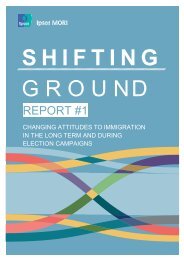Create successful ePaper yourself
Turn your PDF publications into a flip-book with our unique Google optimized e-Paper software.
identity. It is not an identity grounded in either the East or West, but instead negates<br />
all culture and is more interested in cultivating an abstract and transcendental<br />
confessional identity. This is precisely what HuT aimed to popularise in 2003 when<br />
it organised a major conference in Birmingham entitled ‘British or Muslim: Identity,<br />
values, vision’, which attracted just under 10,000 delegates. The question of identity<br />
was reduced to a simple binary choice between Islamism and Britishness.<br />
The conference suggested Muslims should seek to create parallel communi<strong>ties</strong><br />
which do not rely on the British state<br />
and are self-sufficient. A special edition<br />
of Khilafah magazine, then a monthly HuT<br />
publication, carried a series of articles<br />
explaining how this could be done by<br />
exploring a range of social issues from<br />
housing to education; and drug abuse<br />
to marital problems. It even contained ‘a<br />
rough guide to living with<br />
non-Muslims’! 282<br />
HuT also even produced a slick film for the conference. This masterstroke of<br />
propaganda juxtaposed cold, atomised and sterile images of the British state<br />
against those of personalised and character-led Muslim actors. One participant in<br />
the film – a member of Hizb ut Tahrir – told the audience:<br />
I’m not British even though I was born in this country, and I’m not Palestinian even though my<br />
parents were born in Palestine – and my children, they’re not Pakistani even though their mother’s<br />
parents were born in Pakistan. No. We are Muslim, and our allegiance is not to Britain or any Arab<br />
culture or any Pakistan culture. Our allegiance is only to Allah and to Islam. 283<br />
It can be tempting to dismiss these examples from Hizb ut Tahrir and Al-Ghurabaa<br />
as representing only the fringes. Yet, while they are at the forefront of articulating<br />
this idea most vociferously – it is by no means restricted to them alone. Two<br />
Dispatches investigations by Channel 4 have obtained footage showing children<br />
being taught an isolationist message in schools. 284 The presenter of the latter<br />
documentary wrote at the time of its release:<br />
We recorded a number of speakers giving deeply disturbing talks about Jews, Christians and atheists.<br />
We found children as young as <strong>11</strong> learning <strong>that</strong> Hindus have 'no intellect'. We came across pupils<br />
being told <strong>that</strong> the 'disbelievers' are 'the worst creatures' and <strong>that</strong> Muslims who adopt supposedly<br />
non-Muslim ways, such as shaving, dancing, listening to music, and – in the case of women –<br />
removing their headscarves, would be tortured with a forked iron rod in the after-life. 285<br />
One of the best known Deobandi leaders in the country is Riyadh ul-Haq. A large-scale<br />
investigation conducted by The Times into his preaching in 2007 also revealed him to<br />
be promoting an exclusionary religious and political identity for British Muslims. In<br />
one sermon entitled ‘On Our Responsibili<strong>ties</strong> as Muslims’ delivered in May 2006, Haq<br />
reinforces the idea of a politicised, global ummah consciousness.<br />
It’s become insane <strong>that</strong> as Muslims in this country we are more concerned about the frequency<br />
of our bins being emptied than we are about Muslim women being raped, children being<br />
Bri�sh Muslims and Barriers to Entering the Armed Forces<br />
“ The concept of the ummah is therefore<br />
inextricably intertwined with an iden�ty <strong>that</strong> is almost<br />
exclusively formed on confessional lines and informed<br />
by a series of Islamist values <strong>that</strong> are deemed to be<br />
incompa�ble with those of the West ”<br />
282 Khilafah Magazine<br />
(September, 2003). A copy of this<br />
is in Policy Exchange’s possession.<br />
283 ‘British or Muslim: The<br />
identity dilemma’, Hizb ut Tahrir<br />
video (2003). A copy of this is in<br />
Policy Exchange’s possession.<br />
284 See: Undercover Mosque,<br />
2007, transcript supplied to Policy<br />
Exchange by Hardcash<br />
Productions; and Lessons in Hate<br />
and Violence, broadcast February<br />
14, 20<strong>11</strong>.<br />
285 http://www.channel4.com/<br />
programmes/dispatches/articles/l<br />
essons-in-hate-and-violencefeature<br />
policyexchange.org.uk | 63



